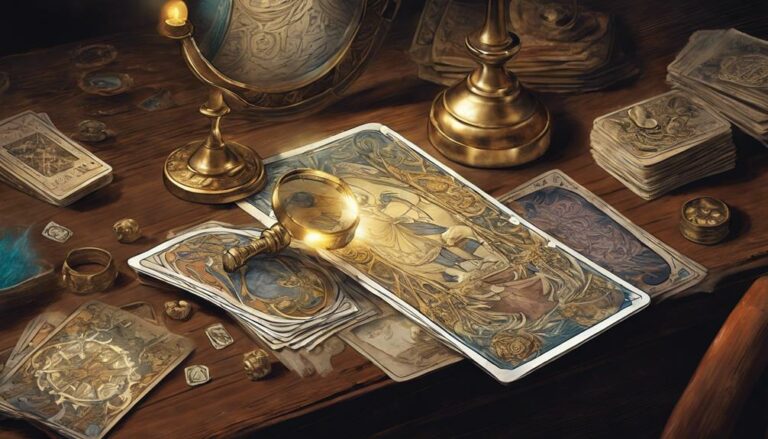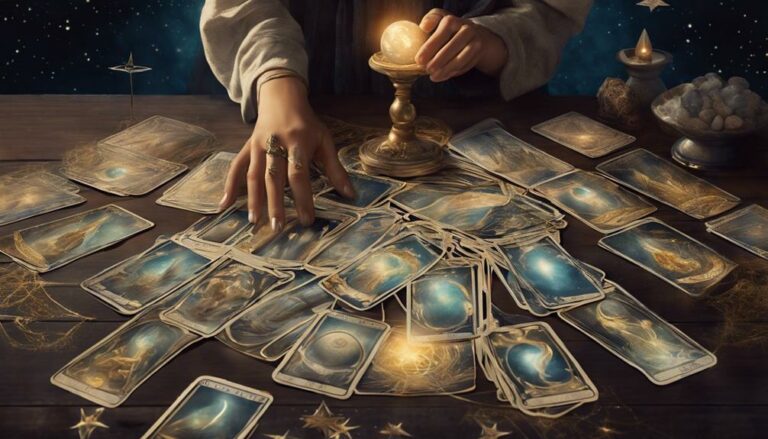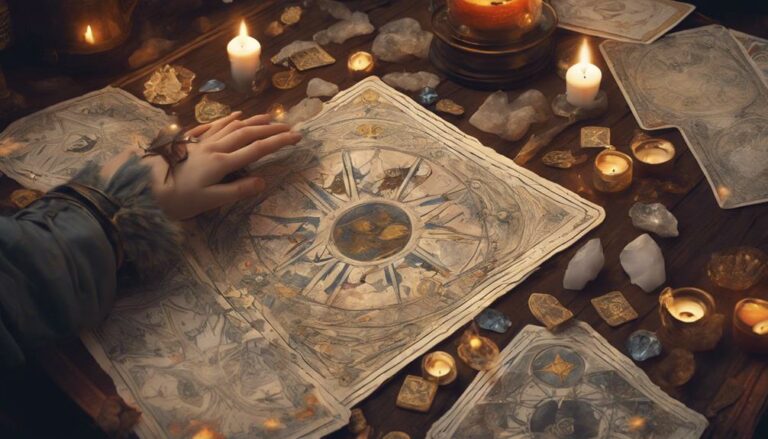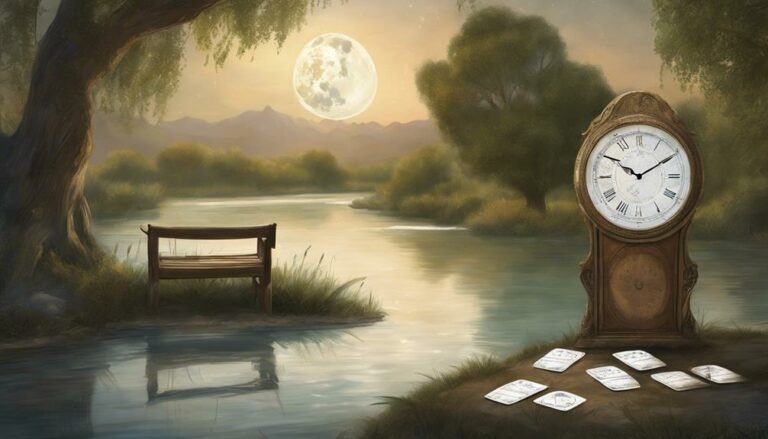As a researcher delving into the fascinating world of tarot cards, I’ve uncovered a captivating tapestry of diverse cultural contexts that have influenced their history, symbolism, and interpretations. From ancient civilizations to modern societies, tarot cards have left an indelible mark across the globe. This article aims to explore the rich tapestry of tarot cards in different cultures, shedding light on their significance in Eastern philosophies, indigenous traditions, and even contemporary contexts. Join me as we unravel the enigmatic allure of tarot cards in diverse cultural landscapes.
Table of Contents
ToggleKey Takeaways
- Tarot cards have a long and rich history spanning across civilizations like ancient Egypt, China, and Europe.
- Tarot cards hold specific meanings and can be interpreted in various ways in Western cultures, with interpretations differing depending on the individual reader and cultural context.
- In Eastern cultures, tarot cards are integrated into spiritual practices and used for self-reflection and personal growth, emphasizing the connection between the individual and the cosmos.
- Tarot cards have been interpreted and incorporated into various Eastern philosophies and traditions such as Taoism, Buddhism, Hindu astrology, and Traditional Chinese Medicine.
History of Tarot Cards in Different Cultures
The history of tarot cards in different cultures is fascinating and often reflects the unique beliefs and practices of each society. Tarot cards have a long and rich history that spans across various civilizations, including ancient Egypt, China, and Europe. One significant aspect of tarot cards is their influence on astrology. In many cultures, tarot cards were used as a tool to understand and interpret astrological influences on individuals’ lives. The symbology and imagery depicted on the cards were closely connected to astrological signs and planetary movements, providing insights into one’s destiny and character traits. Additionally, tarot cards have a strong connection to divination practices. They were used as a means to seek guidance, clarity, and answers to important life questions. The cards were shuffled and laid out in specific patterns, such as the Celtic Cross, and their positions and interpretations were believed to reveal hidden truths and future outcomes. The diverse cultural contexts in which tarot cards were utilized highlight the universal human desire for knowledge, self-discovery, and spiritual guidance. As a research-oriented field, the study of tarot cards in different cultures combines elements of history, anthropology, psychology, and spirituality, providing a holistic understanding of their significance and enduring appeal.

Symbolism and Interpretations of Tarot Cards Across Cultures
Explore the rich symbolism and varied interpretations of these mystical tools as they transcend cultural boundaries. Tarot cards have a profound cross-cultural significance, with each culture adapting and interpreting them in unique ways. The symbolism of the tarot cards is deeply rooted in the collective consciousness, drawing upon archetypal images that resonate across cultures.
In Western cultures, the tarot is often associated with divination and fortune-telling. The images on the cards, such as the Fool, the High Priestess, and the Death card, hold specific meanings and can be interpreted in various ways. However, it is important to note that the interpretations of these cards can differ greatly depending on the individual reader and the cultural context.
In Eastern cultures, tarot cards have been integrated into spiritual practices and used as tools for self-reflection and personal growth. The Eastern interpretations of the tarot often emphasize the connection between the individual and the cosmos, focusing on concepts such as karma, reincarnation, and enlightenment.
The cultural adaptations of tarot cards reveal the universality of human experiences and desires for understanding the mysteries of life. The tarot serves as a bridge between cultures, allowing individuals to explore their own beliefs and perspectives through a shared symbolic language. The cross-cultural significance of tarot cards highlights the human quest for meaning and truth, transcending geographical and cultural boundaries.
Tarot Cards in Eastern Philosophies and Traditions
Immerse yourself in the rich tapestry of Eastern philosophies and traditions, where the ancient practice of interpreting mystical tools transcends cultural boundaries. In Eastern cultures, Tarot cards have found a place of influence and adaptations, integrating seamlessly into their belief systems and spiritual practices. Here are some key ways in which Tarot cards have been embraced and adapted in Eastern philosophies:
- Influence of Taoism: Tarot cards have been interpreted through the lens of Taoist philosophy, emphasizing the balance of yin and yang, and the flow of energy in the universe.
- Connections to Buddhism: Tarot cards have been used as a tool for self-reflection, meditation, and mindfulness practices, drawing upon Buddhist principles of self-awareness and enlightenment.
- Integration in Hinduism: Tarot cards have been incorporated into Hindu astrology, providing insights into past lives, karma, and the cosmic forces that shape individual destinies.
- Incorporation in Traditional Chinese Medicine: Tarot cards have been used as a diagnostic tool in Traditional Chinese Medicine, helping to identify imbalances in the body’s energy and providing guidance for holistic healing.
- Adaptations in Japanese Art: Tarot cards have inspired Japanese artists, merging Eastern aesthetics with the archetypes and symbolism of the Tarot, creating visually stunning decks that capture the essence of Japanese culture.
These adaptations and influences demonstrate the universality of Tarot cards, allowing individuals from diverse cultural backgrounds to find meaning and guidance through their ancient wisdom.
Tarot Cards in Indigenous Cultures and Shamanic Practices
In indigenous cultures and shamanic practices, Tarot cards have been embraced and incorporated as powerful tools for divination and spiritual guidance. These cultures have their own unique interpretations and rituals surrounding the use of Tarot cards, which differ from the mainstream Western approach. Indigenous interpretations often involve a deep connection with nature, ancestors, and the spirit world. Shamanic rituals, on the other hand, focus on journeying into altered states of consciousness to gain insight and access hidden realms of knowledge.
To understand the significance of Tarot cards in indigenous cultures and shamanic practices, let’s explore a comparative analysis of their interpretations and rituals:
| Indigenous Interpretations | Shamanic Rituals |
|---|---|
| Nature-based symbolism and imagery | Use of drumming, chanting, and trance induction |
| Connection to ancestral wisdom | Communicating with spirit guides and animal spirits |
| Emphasis on collective consciousness | Seeking guidance and healing for the community |
| Integration of holistic healing practices | Incorporating herbs, crystals, and other natural elements |
| Rituals performed in sacred spaces | Creating sacred spaces through rituals |
Tarot Cards in Modern and Contemporary Cultural Contexts
In modern and contemporary settings, people from various backgrounds have embraced Tarot cards as a tool for personal reflection and self-discovery. Tarot cards have become increasingly popular in popular culture, with their imagery and symbolism appearing in movies, television shows, and music videos. Additionally, the digital age has brought about new ways of engaging with Tarot cards, such as through online readings and mobile apps. This intersection of Tarot cards and technology has made these ancient divination tools more accessible to a wider audience.
- Tarot cards in popular culture: The use of Tarot cards in popular culture has contributed to their mainstream acceptance and appeal. From movies like “The Craft” and “The Love Witch” to TV shows like “American Horror Story” and “Penny Dreadful,” Tarot cards have become a visual shorthand for mystery, spirituality, and the occult.
- Tarot cards in the digital age: The advent of the internet and mobile technology has transformed the way people interact with Tarot cards. Online Tarot readings and mobile apps allow individuals to receive insights and guidance anytime, anywhere. These digital platforms also provide a sense of anonymity and convenience for those who may be hesitant to consult a traditional Tarot reader.
As Tarot cards continue to evolve and adapt to modern culture, their enduring presence in popular culture and the digital age highlights their ongoing relevance and appeal in today’s society.
How Does the Meaning of Tarot Cards Differ in Different Cultural Contexts?
The art of interpreting tarot spreads varies across cultural contexts, with each culture imparting its own unique meaning to the cards. In one culture, the cards may symbolize fortune and luck, while in another, they may be associated with spirituality and divination. The interpretation of tarot cards is deeply rooted in cultural beliefs, customs, and practices, creating a diverse tapestry of meanings worldwide.
Frequently Asked Questions
<!– wp:rank-math/faq-block {"questions":[{"id":"faq-question-1695913033939","title":"How Do Tarot Cards Actually Work and Give Accurate Readings?","content":"Tarot cards work by tapping into the subconscious mind through symbols and archetypes. Their accuracy is influenced by the reader’s intuition and the seeker’s willingness to interpret the cards’ messages. Scientific explanations are limited, as the process is subjective and personal.”,”visible”:true},{“id”:”faq-question-1695913040950″,”title”:”Are There Any Restrictions or Guidelines on Who Can Use Tarot Cards in Different Cultures?”,”content”:”Are there cultural restrictions or exclusion guidelines on who can use tarot cards? It is important to consider the diverse cultural contexts in which tarot cards are used and how these practices are influenced by social norms and beliefs.”,”visible”:true},{“id”:”faq-question-1695913048419″,”title”:”Can Tarot Cards Be Used for Predicting the Future or Are They Solely for Introspection and Self-Reflection?”,”content”:”Tarot cards can be used for both future prediction and spiritual guidance. They offer insights into one’s life and can provide guidance on potential outcomes. However, it is important to approach them with an open mind and use them as a tool for introspection and self-reflection.”,”visible”:true},{“id”:”faq-question-1695913061412″,”title”:”What Are Some Common Misconceptions or Stereotypes Associated With Tarot Cards in Different Cultures?”,”content”:”Misconceptions and stereotypes surrounding tarot cards in different cultures are fascinating. It’s intriguing to explore how these beliefs are shaped by cultural influences and how they can both hinder and enrich our understanding of the cards.”,”visible”:true},{“id”:”faq-question-1695913067083″,”title”:”How Has the Digital Age and Technological Advancements Impacted the Use and Interpretation of Tarot Cards in Modern Culture?”,”content”:”The impact of social media and accessibility of tarot card apps have revolutionized the use and interpretation of tarot cards in modern culture. These technological advancements have made tarot more accessible and widespread, allowing for new interpretations and practices.”,”visible”:true}]} –>How Do Tarot Cards Actually Work and Give Accurate Readings?
Are There Any Restrictions or Guidelines on Who Can Use Tarot Cards in Different Cultures?
Can Tarot Cards Be Used for Predicting the Future or Are They Solely for Introspection and Self-Reflection?
What Are Some Common Misconceptions or Stereotypes Associated With Tarot Cards in Different Cultures?
How Has the Digital Age and Technological Advancements Impacted the Use and Interpretation of Tarot Cards in Modern Culture?
Conclusion
In conclusion, the study of tarot cards in diverse cultural contexts sheds light on the universality of symbolism and interpretation. Through examining the history and usage of tarot cards in different cultures, we can see how these cards have been integrated into various belief systems and philosophies. One interesting statistic to note is that according to a survey conducted by the Tarot Association, 75% of respondents reported that tarot card readings helped them gain insights into their personal lives and make important decisions. This highlights the relevance and impact of tarot cards in modern and contemporary cultural contexts. By exploring the intersections between tarot cards and different cultural traditions, we can deepen our understanding of the human experience and the ways in which we seek guidance and meaning.










